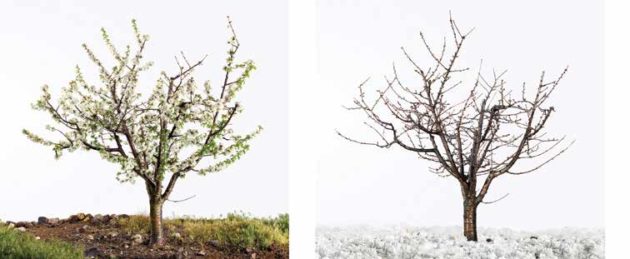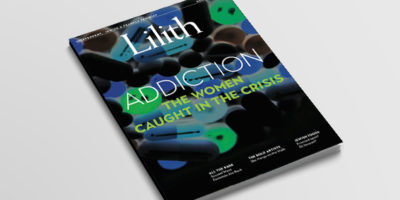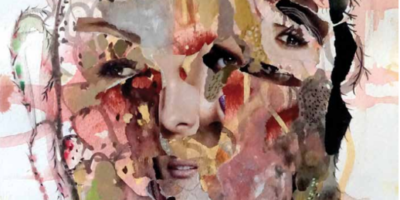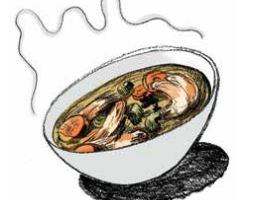
I Don’t Want to Meditate. I Want to Pray.

I came as a stranger. In the fall of 2015, when I first joined a synagogue and began going to weekly Torah study, not only were the words and rituals new to me—the hunger itself was a mystery. I cannot account for it now.
I am half-Jewish by birth, but while my father identifies unequivocally as a Jew, he is (in the confounding way of so many Jews) an atheist, and I was raised to understand our brand of Judaism as an eclectic collage of socialism, folk dance, civil rights marches, an obligation to question authority and knowing not to put mayo on my dad’s turkey sandwich. The Jews I knew argued freely, shrugged freely and joked freely. They played hoops and sat on stoops, belonged to unions, subscribed to radical publications and linked arms in solidarity with underdogs of every stripe. I associated Jews who belonged to synagogues with a kind of upper-middleclass narrow-minded sanctimony, and Hebrew (as opposed to Bronx-inflected Yiddish) with elitism. The idea of Jews as “the chosen people,” when eventually this phrase came to my attention, repulsed me.
And then, two years after my mother’s death and still grieving hard, I found myself—perplexingly, voraciously—turning to Jewish texts, Jewish writers. Buber, Heschel, Levinas, Bialik, Oz, Ozick, Zornberg, Grossman, Amichai. Each distinct, their voices yet affected me similarly. I felt in them a sorrow-laden liveliness, an indefatigable commitment to search that was strengthened, not weakened, by intimate knowledge of suffering. I made forays into other traditions, too, dipped into Christian and Buddhist writings, experimented with mediation, and had long conversations with my friend Tina, an Episcopal priest. The following summer I spent a few days with her on Martha’s Vineyard, where she’d been given use of a ramshackle cottage for two weeks in exchange for leading services at Trinity Church in Oak Bluffs.
On Sunday morning after we finished the breakfast dishes, she set off down the road to preach. I suppose I was sort of trotting along after her when she turned around and said, “What are you doing?”
“Oh. Going with you.”
She shook her head, kindly. “No. You stay here and have church on the porch.” When I hesitated she added, “Read your book.” I’d been reading Heschel’s The Sabbath earlier that morning on the weather-beaten wicker chaise, and it lay there still, splayed face-down on the faded cushions.
She knew better than anyone about my raw and tender explorations; there is no one I trust more in these matters. So I did as she said, went back up on the porch and resumed reading. It’s a short book and at some point in that next hour or so while I sat finishing the day brightened and a salt breeze rippled the tall grasses and I became aware that I was crying. It was as if I’d spoken aloud, so clearly did I hear my own voice say, But I don’t want to meditate—I want to pray!
And as clearly—clarifyingly—in that instant I understood that it was Judaism I wanted. Was already turning toward. It would be easy to mistake this movement for a turning away from my non-Jewish mother. I know this because of questions put to me by acquaintances, intimations that her death perhaps had liberated me to pursue my Jewishness. As though it would have been a kind of bad manners while she was alive. As though it would have been a betrayal.
Nothing could be further from the truth.

I’m now in my fourth year at Temple Beth Zion. From the first time I attended services here on a dusty blue summer evening, I knew it was the place for me. I’d tried out various temples by then. One felt vast and sleek as a five-star hotel. One felt generically suburban. Another seemed more Puritan than Jewish.
TBZ’s aesthetic might be called neo-shtetl. The bindings of our chumashim—books of Torah—are loose and cracked. Those of us who attend weekly Torah study are a ragtag bunch. We are not what you would call fashion plates. We sit around folding tables and discuss the text and raise questions and voice opinions and disagree with one another. Someone makes a joke and we all crack up and then we go on studying. When we’re troubled by a passage, we say it. When we’re moved by a passage, we say it. When we can’t make head or tail of a passage, we say it. The rabbi gives an epic shrug and says, only partly in jest, “Please. You shouldn’t suffer under the illusion that I understand.” The rabbi says, “Just so you know, we’re not the first ones ever to struggle with this.” The rabbi says, “By the way, I’ll let you in on a little secret: that’s what it means to be Jewish.” To struggle with the tradition. We chuckle, we nod, we ponder, then half of us start talking again at once. We are in this together.
Yet for all the warmth and all the comradery at TBZ, after nearly four years I remain in some critical way hovering upon the threshold. I didn’t grow up in this world. I do not entirely fit in. To some members of my community I am not even a Jew, Judaism following the rule of matrilineal descent. At times this has been—let me not gloss over it—painful. Yet if I remain on the threshold, the fact is: I remain. I recognize this place as where-I-want-to-be. Why? Why on earth would anyone desire membership in a community to which she does not belong, quite?
Well, but that is my mother’s milk. Not belonging, quite. And the threshold? My homeland. Looking back through my life now I see that the threshold, as often as not, is where I could be found. Perched on one foot. Like a flamingo.
And little wonder. My family of origin was black and white, deaf and hearing, Jewish and gentile. I was raised attending gatherings at which I was rarely more than a partial member and frequently something less: a visitor lacking real claim or status, admitted on a sort of temporary visa. Often I wished it otherwise, ached to truly belong. For years I fantasized about becoming deaf so I could be a full-fledged member of that culture. Riding the NAACP bus to marches on Washington, I wished fervently to be black like everyone else. On Sunday mornings after sleeping over at my best friend’s house, I’d accompany her family to Grace Church overshadowed by feelings of longing and shame, as though in some way everyone was too tactful to mention my presence sullied their pew.
Gradually I came to appreciate my patchwork origins. To relish hailing from a place where blind loyalty has no currency because pledging allegiance to any one part of my family would be to disavow the others. I grew to understand that qualifying as neither this nor that means being free from the myth of clannish purity. To understand that familiarity with discomfort can be a bridge to fathoming the discomfort of others. Now I regard these gifts—the gifts of humility and perspective—as a rich inheritance. And in every encounter that stirs up feelings of estrangement I see not a departure from my roots, but a return.
Four summers ago, after my epiphany on the porch in Martha’s Vineyard, I returned to Boston and began searching for a Jewish community. I attended services at various synagogues, asked people for recommendations, and went round meeting various rabbis. A newly-minted lesbian rabbi in whose office I cried. A deaf rabbi, the son of an old family friend, who knew how to juggle fire. An elfin-featured rabbi who held services in his home shtibl (a Yiddish word meaning little place of communal prayer). This last had wire-rimmed glasses and a living room full of folding chairs. It was he who said, with a kind of hushed intensity, “Did you know your name means ‘the stranger’?”
“Um…I always thought it meant ‘weary-eyed’?”
“Not your first name, your middle name. In Hebrew ha ger means ‘the stranger’.”
I had been given, for a middle name, my grandmother’s maiden name. Her family had come from Bukovina, a historical region in Eastern Europe; I knew the derivation was likely not Hebraic. Yet when the rabbi spoke, I felt a wet heat break out all over my body. It was like a flush of recognition, only it was I who felt seen. As though I were gazing into the first mirror I’d ever known, the dark brown eyes of my mother. Yes, I thought. The stranger.
Leah Hager Cohen is the author of five works of nonfiction, including Train Go Sorry, and six novels, including The Grief of Others. Her latest novel is Strangers and Cousins.
ART: TAL SHOCHAT, “LESSONS IN TIME 5 (CHERRY TREE)”




